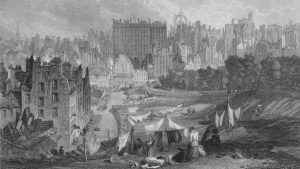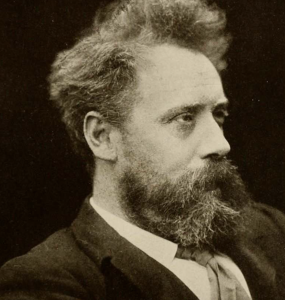Our final poetry news round-up of the week takes a look at one of the first known written occurrences of the F-Word and some misquoted poetry.
The F-Word
 The current Coronavirus pandemic isn”t the first time, and may well not be the last time, that people have had to isolate themselves. Almost 500 years ago people were in isolation in an attempt to avoid the plague.
The current Coronavirus pandemic isn”t the first time, and may well not be the last time, that people have had to isolate themselves. Almost 500 years ago people were in isolation in an attempt to avoid the plague.
During this time George Bannatyne, a Scottish merchant stayed indoors in Edinburgh to ensure that he avoided the infection. He was bored with so much free time and so began collecting poems, these eventually became a manuscript. According to a document that aired on BBC Scotland this week this manuscript contains one of the first known uses of the f-word.
The Flyting of Dunbar and Kennedie, a work by the poet William Dunbar is included in the manuscript which is currently housed at the National Library of Scotland. The work is often referred to as the “16th century equivalent of a rap battle” between the poet and Walter Kennedie.
The fact that some rather strong words are contained within the poem comes as little surprise to most. Those swearwords that are now used commonly were often used as part of good-natured banter at the time. The poem in question is a particularly good example of a slanging match between two poets of the era and is widely accepted to be one of the first written documents to show them in use.
Referred to as the Bannatyne Manuscript, this is one of the oldest surviving examples of older Scots poetry. It was gifted to the library in 1772 having previously been owned by Bannatyne’s descendants. The Manuscript was recently shown on the BBC documentary, “Scotland Contains Strong Language”.
Poetry Misquoted
 Public figures are quite fond of using poetry to illustrate a point and unfortunately, they are also quite prone to misquoting some of the most famous lines from poems.
Public figures are quite fond of using poetry to illustrate a point and unfortunately, they are also quite prone to misquoting some of the most famous lines from poems.
Earlier this week the chief medical officer of Canada, Dr Theresa Tam quoted from one of the most famous poems in the English language during her address about Covid-19.
Referring to the lines by the poet William Ernest Henley she said: “We are the authors of our fate”. The poet never actually used the word author he chose the more compelling master “I am the master of my fate” was the fateful line that he wrote in 1875. He had just had emergency surgery that resulted in his leg being saved from amputation. He followed this line with “I am the captain of my soul”. Both lines, of course, are from the very popular poem “Invictus”. The poem is quite popular with public figures looking to illustrate a point it was also quoted by Winston Churchill during a Commons address and by Nelson Mandela during his time in prison.
Whilst the misquoting of the lines left people wondering if in fact the doctor had changed them for greater impact in her speech or had simply remembered them incorrectly. It is entirely possible that given the current situation in the world, she was simply tired, stressed and got it wrong.


You must register to comment. Log in or Register.